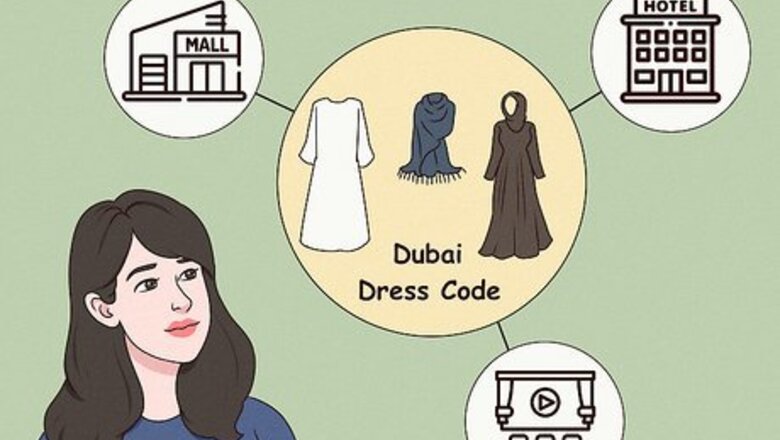
views
Knowing the Dress Code Rules
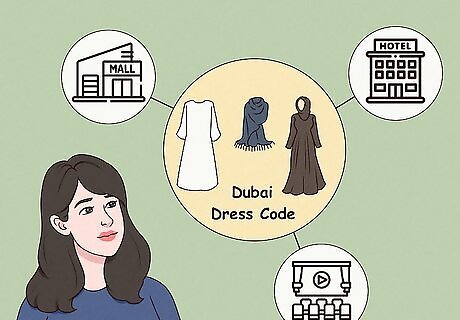
Know when the dress code applies. The dress code in Dubai does not apply to your own home or inside your hotel room. You can wear whatever you want there. However, it does apply to public places. Examples of public places where the dress code applies include theaters, markets, malls, supermarkets, and the public areas of hotels. When you are inside your car driving on a public roadway, the dress code still applies. You may be given an abaya to wear when you visit an official government building or courts. This is a piece of clothing that covers what you are wearing.
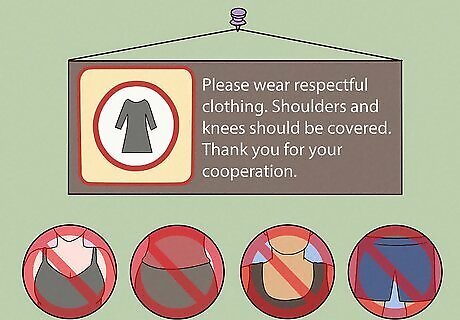
Follow the key rules. They may not be what you’re used to, but they show cultural respect and will stop you from getting into trouble. The general rule is that you should cover everything from your shoulders to your knees. Avoid showing cleavage, and watch clothing that is tight or see through. Women should not wear sleeveless garments. For men, this means you should not show your bare chest in public. Avoid shorts, especially short ones, and don’t wear swimwear outside of the pool or beach area. Don’t unbutton your shirt to show chest hair. Men should not show their knees, either.

Choose some common wardrobe staples. There are certain pieces of clothing that comply with the dress code. So you might want to pack a lot of them. Pashmina shawls can be used to cover up, including in your car. Capri pants will keep your legs cool but still cover up enough. A scarf is a good idea when visiting a mosque. T-shirts are fine. Spaghetti strap tops aren’t a good idea. Leggings can be work under short dresses to cover the legs. Cardigans are a good choice for covering the shoulders. However, don’t wear leggings as your only pants.
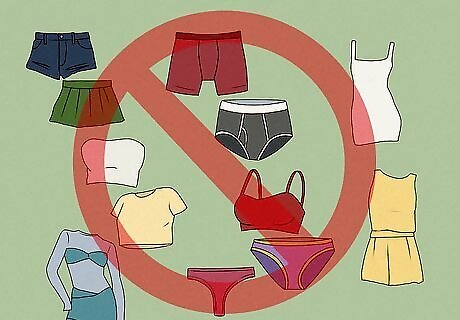
Avoid banned items. You’re going to be in trouble if you choose certain clothing items in Dubai, so it’s best to avoid them completely. Daisy Duke shorts, very short mini-skirts, tube tops, crop tops and mesh dresses can violate the dress code. Cover underwear, and keep it from public view. Under no circumstances, should your underwear be visible in public. G-strings, bras, and underwear briefs that show through clothing will violate the dress code. Lycra body dresses and very short playsuits also might get you in trouble. The same is true of clothing with see through fabric or cut outs.
Following the Dress Code in Different Locations
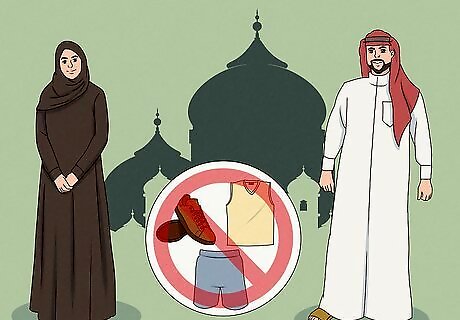
Dress correctly to enter a mosque. If you want to go inside a mosque, there are very strict rules for your entrance. You might not be allowed in the mosque in the first place if you are a non-Muslim. You might be provided with clothing you can put over your clothes, called an abaya for a woman and kandourah for men. You will be asked to remove your shoes. Women must cover the hair and entire body. Men don’t have to cover the hair but should not wear shorts or sleeveless shirts.
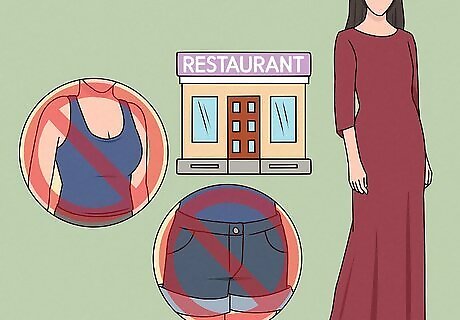
Wear the right clothes to restaurants or bars. Many upscale restaurants, especially those that sell alcohol, will require men to wear covered shoes and long trousers. For women, it’s a good idea not to show cleavage or thighs, although sandals are fine. The dress code is generally looser at nightclubs or bars. Malls have signs instructing customers to cover their shoulders and knees.

Wear the right clothes when working out. You may need to know what to wear to the gym or while running. You can wear normal workout gear in a hotel or private gym. When running outside, wear longer shorts and a lightweight top if you are male. Women can get away with wearing running leggings as long as they go past the knee.
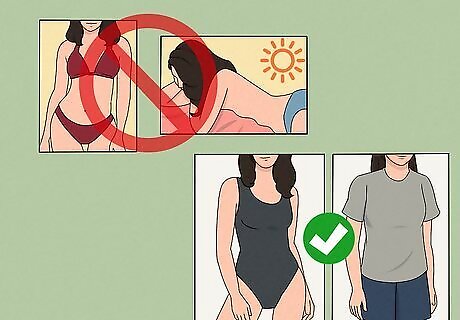
Wear the right swimwear. It’s allowed to wear bikinis and swimsuits around pools or when you are at the beach, but there are some limitations. Don’t wear thong swim suit bottoms. Change your swimwear before you leave the pool or beach area and, say, go into a store. It’s a violation of the dress code to wear wet swimsuits under clothing if the clothing then becomes see through. Topless sunbathing is not allowed in Dubai; in fact, it’s illegal. Choosing a one-piece swimming suit is probably a good idea. At public beaches, wearing a T-shirt and shorts is a better idea.
Dealing with Questions

Handle criticism well. You may find that various people, ranging from security guards to colleagues, might suggest your dress is offensive. Sometimes such people are trying to help you by providing advice. It’s best to remain calm and apologize. If possible, you could say you will go back to the hotel or home to change. The problem with getting angry or resisting this change is that the police could get involved then, and you don’t want that. You could just throw a Pashmina shawl around your shoulders and avoid a stickier situation.
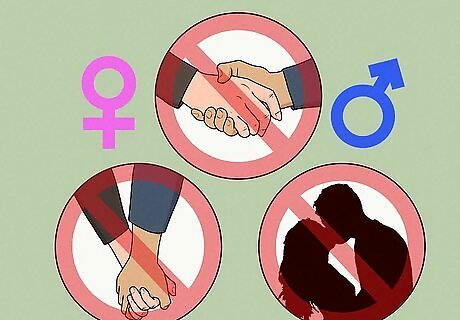
Follow rules for public displays of affection as well. In addition to dress, keep public displays of affection for private times. It’s all about Dubai’s cultural modesty requirements. Don’t hold hands, hug, or make out in public. Be aware that Islamic women in Dubai might not appreciate a handshake or eye contact. A British couple was jailed for a month because they kissed each other in public. You could be arrested for offending public decency especially if the complaining person is Muslim and a citizen of the United Arab Emirates. You could be deported or end up with a month in jail. Learning to dress in a culturally respectful way. "I was visiting Dubai and was confused about what was appropriate to wear. Now that I've learned about how to dress respectfully, my main concern is about holding hands in public. My husband and I have been married for 45 years and may do it without realizing it." - Phyllis S. Understanding what "modest" clothes means. "As a non-Muslim heading to Dubai, I worried whether my regular wardrobe would be modest enough. After some quick research on guidelines for travelers, I decided to wear a headscarf when out around town—just to be respectful. And I'm so glad I did! It not only let me blend in more, but opened up all sorts of great conversations with locals wanting to share about their culture and beliefs. I managed to pick up a little Arabic too to help get by. Even with my limited language skills, people were incredibly welcoming. Going the extra mile to follow local customs on appearance made a huge difference in having such an eye-opening visit. It meant so much to be able to connect authentically, even as an outsider." - Avincita M. Did you know that wikiHow has collected over 365,000 reader stories since it started in 2005? We’d love to hear from you! Share your story here.




















Comments
0 comment